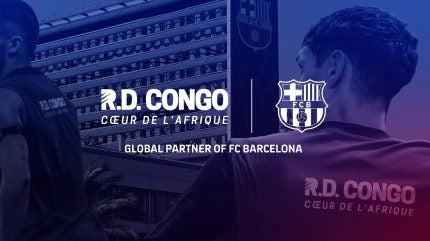
FC Barcelona, one of the biggest soccer clubs globally, continues to attract significant brand partnerships due to its extensive global fanbase and a powerful brand identity encapsulated in its motto, “Més que un club” (More than a club).
Recently, the club signed a four-year sponsorship agreement with the Democratic Republic of the Congo’s (DRC) Ministry of Sports and Leisure, worth a reported €10 million ($11.56 million) per year. This partnership positions the DRC as FC Barcelona’s training kit sponsor and a global empowerment partner.
However, the deal has sparked controversy, raising questions about the ethics of such sponsorship in the context of the DRC’s socio-political situation.
Though the agreement is with the Ministry of Sports and Leisure, GlobalData considers it is best classified with the tourist boards sponsorship sector.
Financial Landscape of the Tourist Boards Sports Sponsorship Sector
This agreement marks the seventh-largest annual sponsorship deal between a tourist board and a sports entity, in a field led by the New York Knicks’ two-year deal with Experience Abu Dhabi, which is valued at $30 million per year.

US Tariffs are shifting - will you react or anticipate?
Don’t let policy changes catch you off guard. Stay proactive with real-time data and expert analysis.
By GlobalDataAccording to GlobalData’s 2025 Tourist Boards sector report, they are globally projected to invest $221.14 million annually in sports sponsorship agreements, with soccer leading the sector, generating $135.62 million per year.
The DRC’s foray into sports sponsorship extends beyond FC Barcelona. The country has also formed partnerships with AC Milan and AS Monaco, with the AC Milan deal reportedly valued at €14 million ($16.06 million) per year and the AS Monaco agreement at approximately €1.6 million ($1.84 million) annually.
These collaborations reflect a strategic effort by the DRC to enhance its international visibility and attract tourism and investment. In 2024, the DRC approved a new national tourism policy aimed at transforming the nation’s tourism landscape by 2030.
This ambitious plan seeks to generate $7 billion in annual foreign exchange earnings and create between 200,000 and 500,000 jobs in the sector by the end of the decade. The DRC believes one of the most effective ways to achieve this goal is by partnering with soccer clubs that not only compete domestically but also regularly play in Europe, ensuring that the DRC logo reaches a substantial soccer audience.
The Backlash: Ethical Considerations and Sportswashing Accusations
Despite the financial allure, the sponsorship deal has faced significant criticism. Detractors argue that partnering with a nation plagued by internal conflict, political instability, and poverty constitutes “sportswashing,” a term used to describe the practice of using sports to divert attention from a country’s negative issues.
Critics, including local citizens, activists, and international observers, contend that the DRC government is leveraging this partnership to improve its tarnished reputation rather than addressing pressing domestic challenges, such as chronic underfunding of local sports programs.
In response to the backlash, DRC officials have defended the partnership, asserting that it will enhance the country’s global visibility and potentially lead to increased tourism and investment. They argue that such economic growth could improve local infrastructure and services, ultimately benefiting the citizens.
FC Barcelona’s Financial Imperatives
FC Barcelona’s decision to enter into this partnership is also influenced by its precarious financial situation. The club has been grappling with significant debt, estimated at €1.3 billion, stemming from financial mismanagement prior to the current presidency of Joan Laporta, who returned in 2021.
The club’s financial woes have restricted its operational capabilities and hindered its ability to register new players. In this context, the DRC partnership offers a much-needed influx of revenue, despite the potential reputational risks associated with the deal.
The club likely conducted a thorough risk assessment before finalizing the agreement, weighing the immediate financial benefits against the long-term implications of aligning with a controversial government. Historical precedents, such as the backlash faced by Arsenal supporters against the club’s ‘Visit Rwanda’ sponsorship, highlight the potential for protests and consumer backlash that could impact brand loyalty and sales.
Current Sponsorship Landscape
As of now, FC Barcelona is involved in 34 distinct sponsorship agreements, which collectively yield an annual value of $315.58 million per year. To date, the club has announced three new partnerships in 2025. Below is a detailed breakdown of these three agreements.
FC Barcelona – 2025 New Sponsorship Agreements’ Annual Sponsorship Values (US$M)
| Brand | Brand Industry | Annual Value (US$m) |
|---|---|---|
| Democratic Republic of the Congo | Tourist Boards | 11,560,000 |
| Panasonic | Consumer Goods | 2,600,000 |
| Roca | Consumer Goods | 330,000 |
Navigating the Complex Landscape of Sports Sponsorship
The decision for sports entities to engage in sponsorship deals with nations accused of sportswashing is influenced by a myriad of factors, including market dynamics, brand visibility, and geopolitical considerations. While the financial incentives can be substantial, the associated reputational risks and shifting consumer preferences present significant challenges.
As the global landscape evolves, brands must carefully evaluate the implications of their sponsorship choices, balancing profit motives with ethical responsibilities. The future of sports sponsorship will likely depend on the ability of brands to navigate these complexities while maintaining integrity in a socially conscious marketplace.
Conclusion
FC Barcelona’s partnership with the DRC exemplifies the intricate balance between financial necessity and ethical considerations in sports sponsorship. As the club continues to pursue new partnerships—currently totaling 34 distinct agreements valued at $315.58 million annually—it must remain vigilant in addressing the potential backlash from consumers and stakeholders.
The evolving dynamics of global sports sponsorship will require brands to be more transparent and socially responsible, ensuring that their partnerships align with the values of their fanbase and the broader community.





